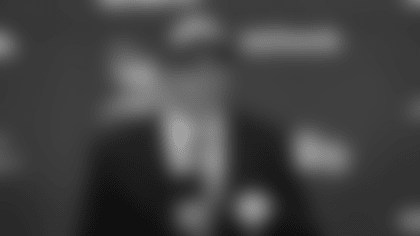The Vikings are taking steps and precautions to ensure the safety and health of not only those within the organization but fans and the surrounding community.
Vikings Chief Operating Officer Andrew Miller joined KFAN's Paul Allen on 9 to Noon Wednesday morning to discuss the COVID-19 pandemic and how the Vikings are responding.
Twin Cities Orthopedics Performance Center closed late last week, and Vikings employees currently are working remotely.
"We've been taking it seriously for a number of weeks now. At first, we were trying to educate our staff on what coronavirus is and how they can do their best to prevent the spread," said Miller, who is at home with his wife and three young children. "We formed an internal committee that's focused on daily issues and outlining protocols for travel."
In addition to having employees work from their homes, the organization also has canceled multiple upcoming events, including the 2020 Vikings Draft Party. The cancelations have been made accordance with guidelines set by the Center of Disease Control as well as national and local government leaders.
"It's really disappointing for us, although it's part of trying to keep large gatherings smaller and keep people having the right social distance in this time," Miller told Allen. "Unfortunately, we have decided to cancel this year's draft party. We know that it's a big event for our fans, and it's fun to come together and cheer for the players that we draft on an annual basis.
"Our priority right now is to help the safety of everyone in the community, so we have made that decision. But we're really looking forward to hosting it again in April 2021," Miller continued. "Again, our whole focus right now is just making sure people know they're taking the right steps to keep safe and to limit the spread of the virus."
Fortunately, based on the current point of the NFL calendar, the Vikings adjustments thus far have been less-drastic than other leagues who have been forced to indefinitely suspend seasons.
But these are unchartered waters for all, and community collaboration – while remaining physically isolated – has been relied on.
"This is a unique situation for everybody, across the community, Miller said. "In talking to other leaders at some of our partners, this is something no one's ever faced in their careers, and I think we're all learning as we go. I think it's been very impressive that our leadership team has continued to adapt and evolve and to listen to each other.
"We've been in touch on a very frequent basis with the other Minnesota sports teams, with the Department of Health, with other experts in the league, just trying to understand what the best things we can do are," he later added. "Obviously, our number-one priority is the health and safety of our players, coaches, staff and the broader community."
Below are additional topics related to the COVID-19 pandemic that Miller discussed with Allen:
Unwavering support from the Wilfs
While Miller oversees the day-to-day operations of the Vikings organization, he expressed gratefulness for the Wilf family ownership group and all the support it's shown during an uncertain time.
"They've been absolutely incredible. They're incredible as owners overall, but their concern has been for each of us as individuals that are employees, and making sure that we're doing the right things as a business," Miller said. "They've been pushing us to take the right steps as leaders to make sure that, even though we all want to continue what we're doing as an organization, that … first and foremost in our minds [is making] sure that our employees, our fans and the general public are safe."
Care for part-time and hourly employees
Miller was asked about part-time and hourly employees related to the Vikings organization who may be affected by the current crisis and anticipated cancelations.
"The people who work game-day and hourly roles for sports teams are really the backbone of our industry," Miller said. "As you think about the thousands of people that work at our games and at the games of the other Minnesota sports teams, and work concerts, those people are really critical to us, and we care deeply about them.
"While we're not in-season right now, so it's a little bit different for us, we absolutely commend the announcement that the Twins, Wild, the Wolves, other teams have made to support those game-day staff members," he continued. "Our commitment is to our staff, and we want to make sure that they continue to get supported and get paid, and we want to make sure we make it right for them."
Prioritizing mental health of employees
Considering the unprecedented nature of the pandemic's global and cross-country effects, whether economically, physically or socially, Allen mentioned the potential for individuals to struggle with anxiety, depression or other mental health challenges.
Miller acknowledged the concern and assured that the mental wellbeing of the employees is just as important as their physical health.
"Regardless of whether it's in this current circumstance or not, the mental health of our employees is absolutely critical to us," Miller said. "We've put in place a number of different measures to provide mental-health support for our employees. This is a unique circumstance. We were talking yesterday as a leadership team about how leaders are communicating with their staff members. It's very isolating to be working at home by yourself.
"We're all used to that social contact, so we're trying to make sure we reach out to our employees, we're talking to people, asking, 'How are you doing?' If there's things we need to do to help, we're going to try and do it," he added.
Looking ahead to the long-term
The COVID-19 pandemic has already forced the league to made tweaks during the offseason, such as canceling all public-facing events surrounding the upcoming 2020 NFL Draft.
Will the virus and its repercussions effect Vikings training camp (typically late July through mid-August) or even the season?
"We are obviously always thinking about the different scenarios that could arise. I think it's probably premature to think that far out," Miller said. "The information we've gotten in the last week or two has changed so dramatically over the course of those couple weeks. Literally, we're taking it day by day and coming up with different decisions on a routine, daily basis. Obviously, we're thinking about what the long-term could hold, but we're obviously hopeful that everything returns back to normal in a shorter period of time."














